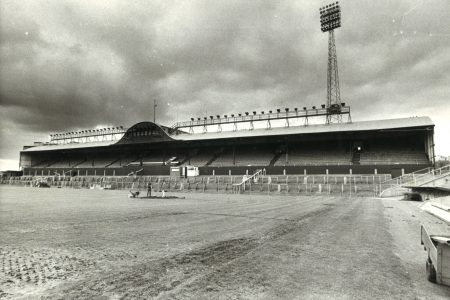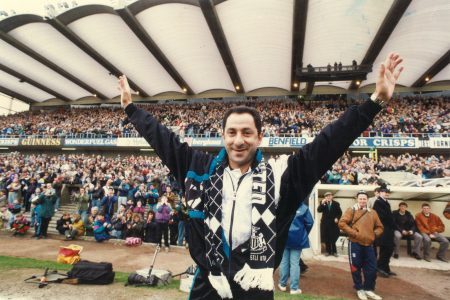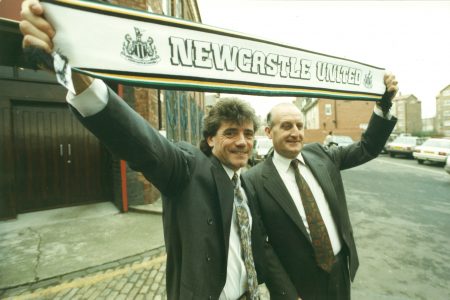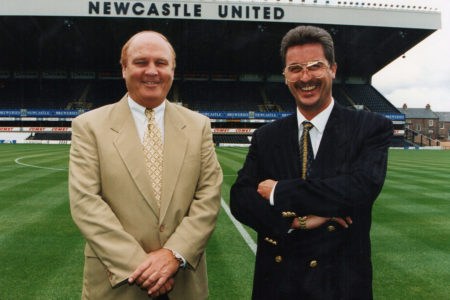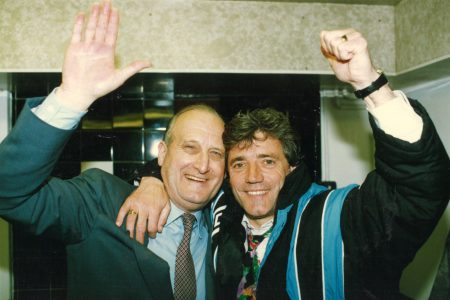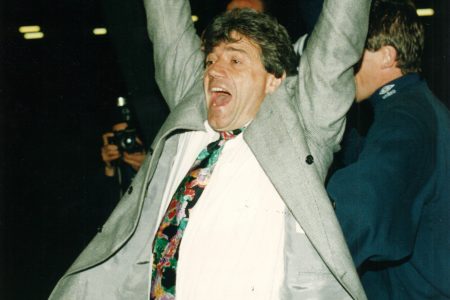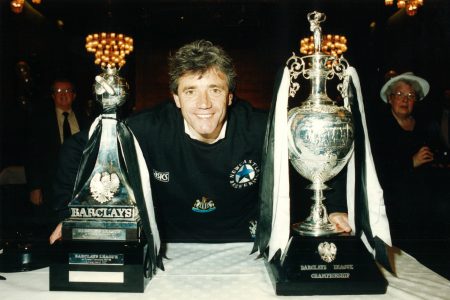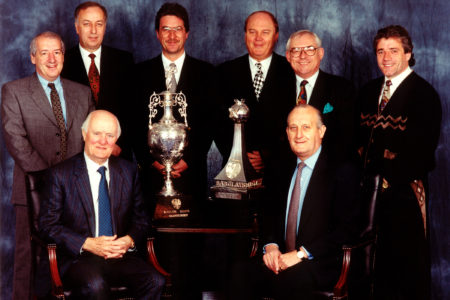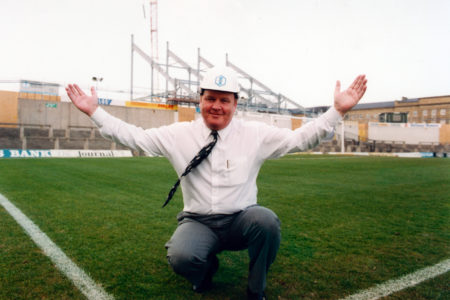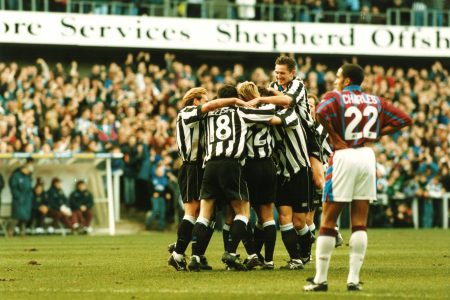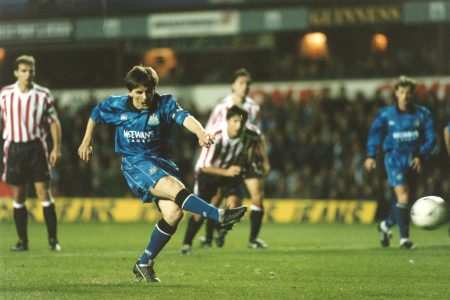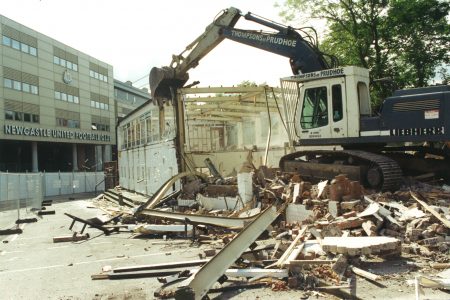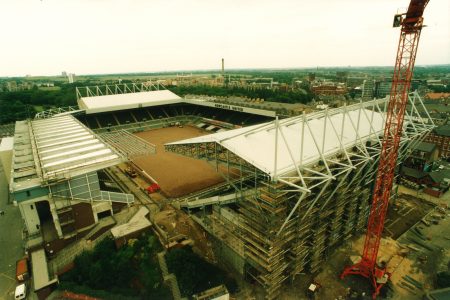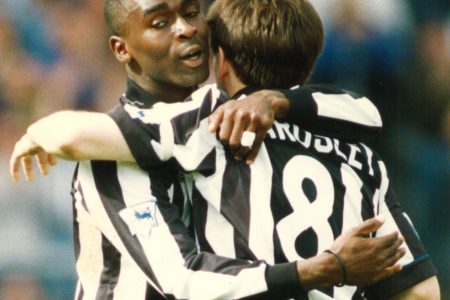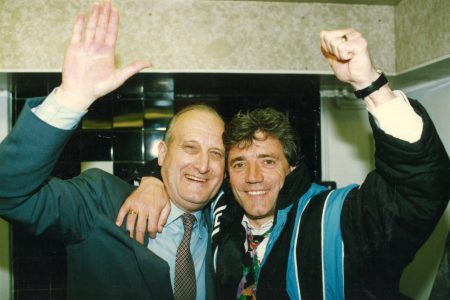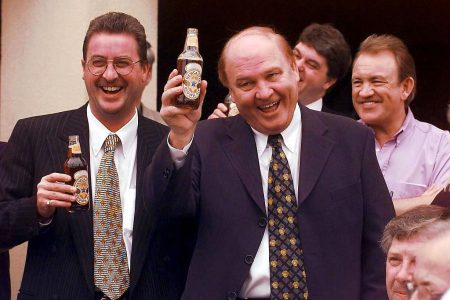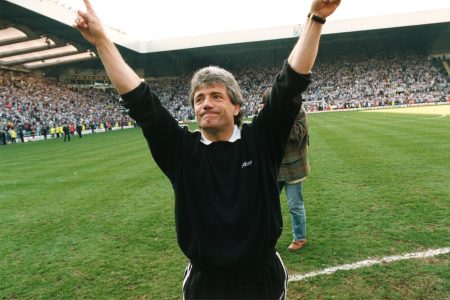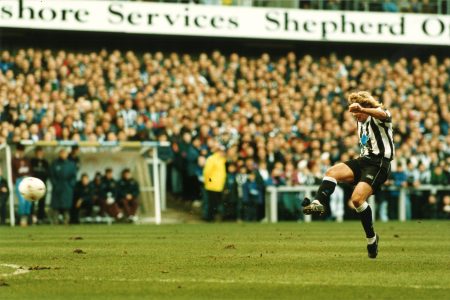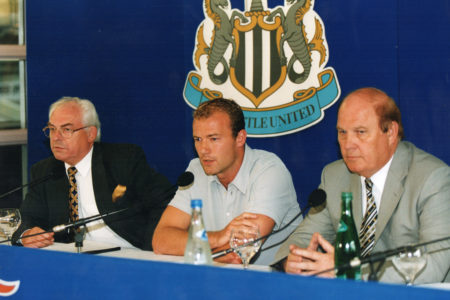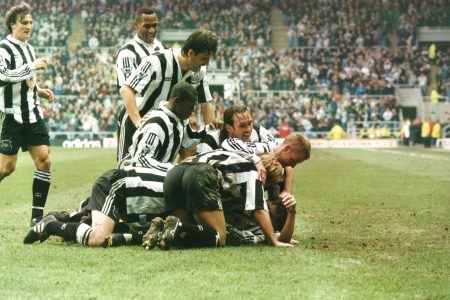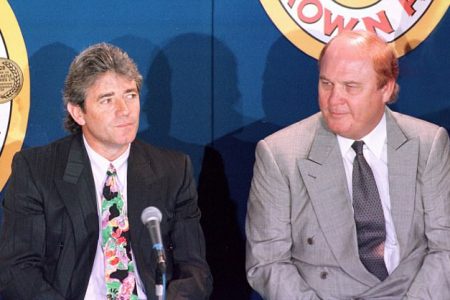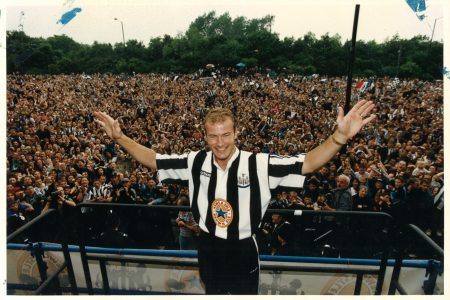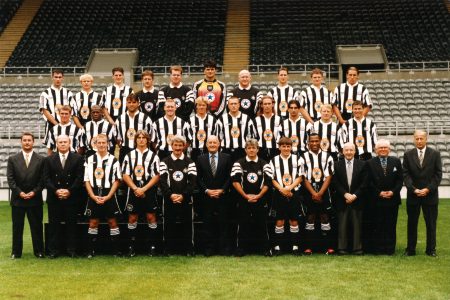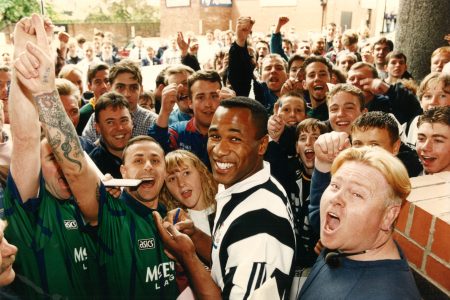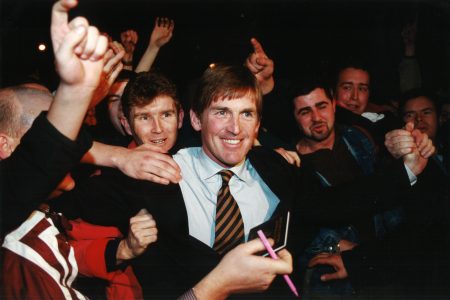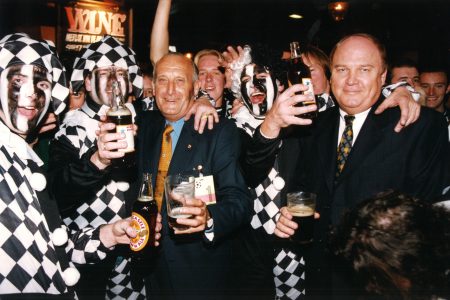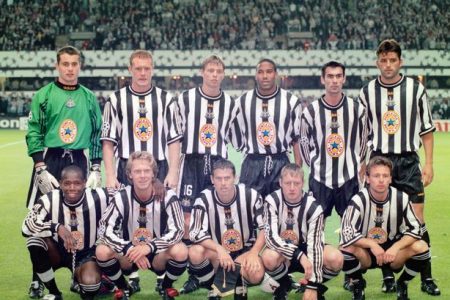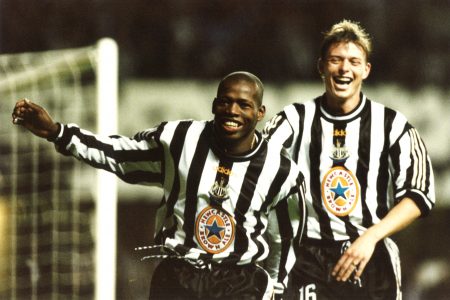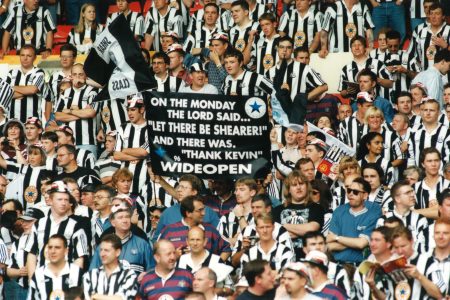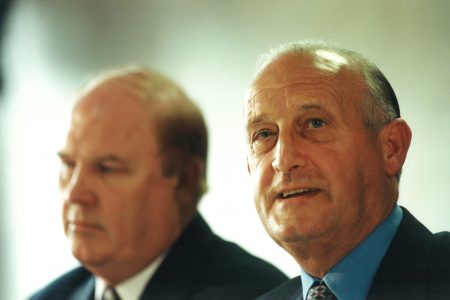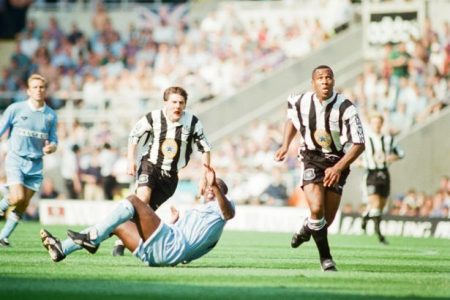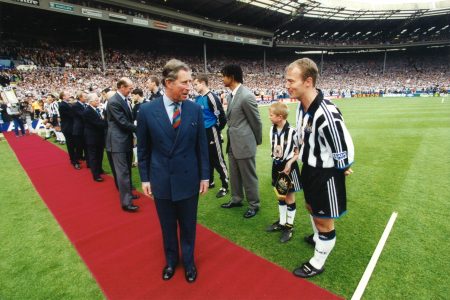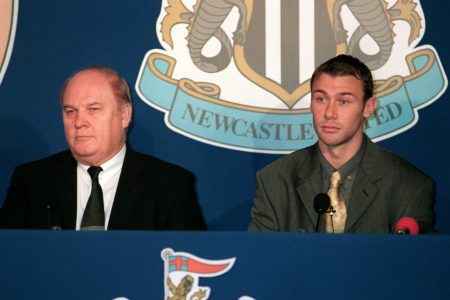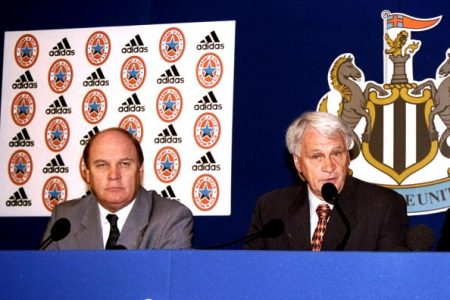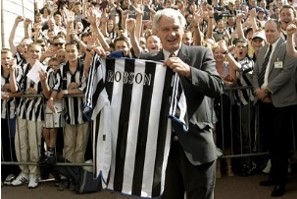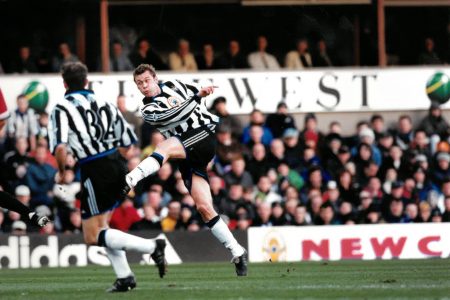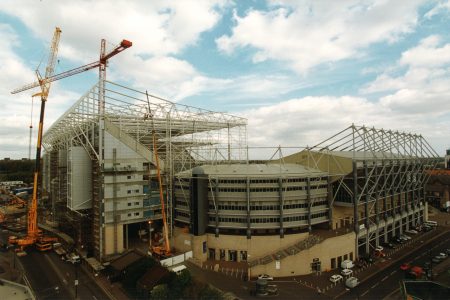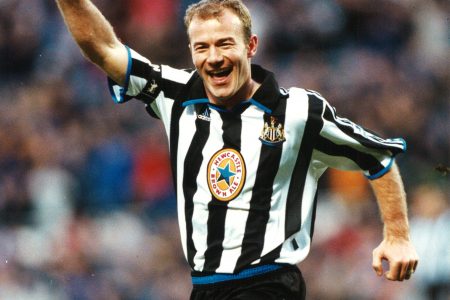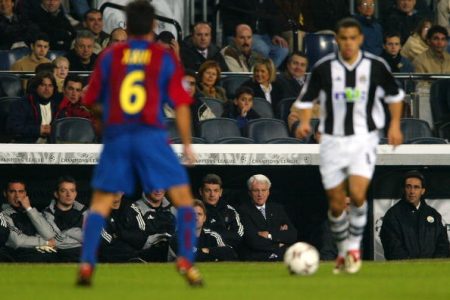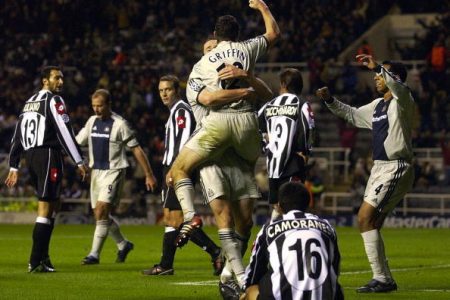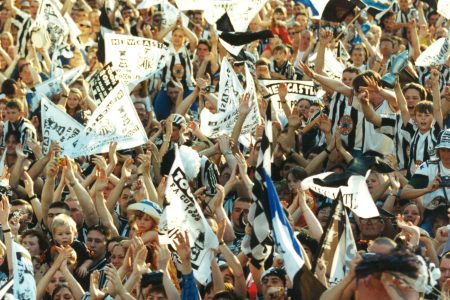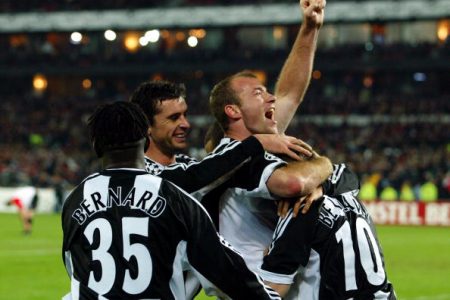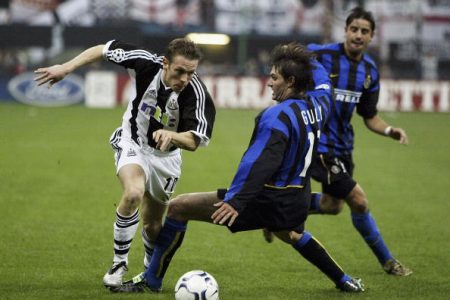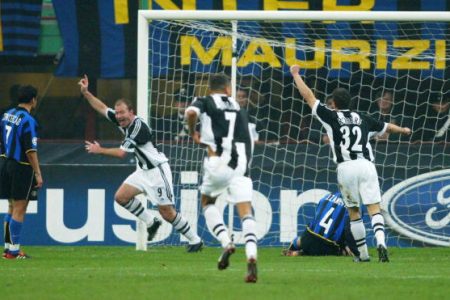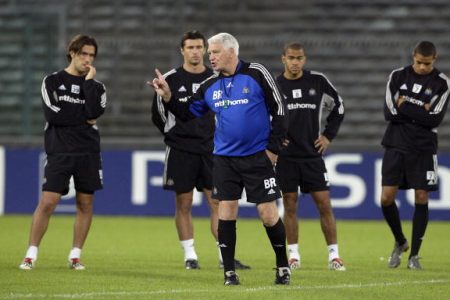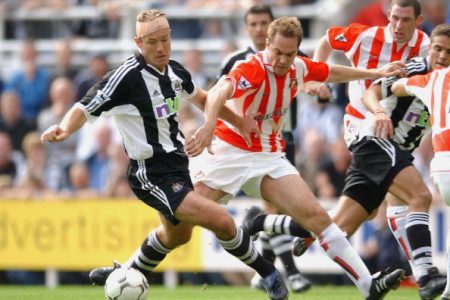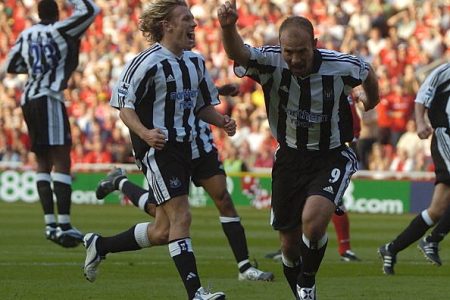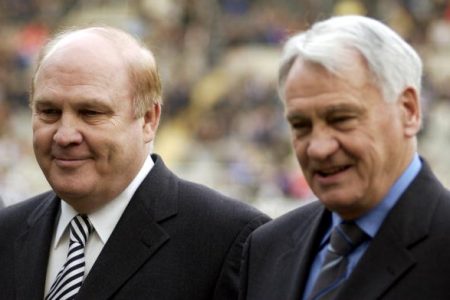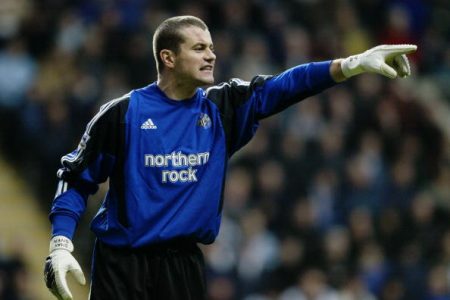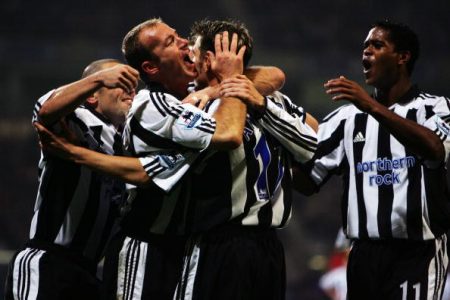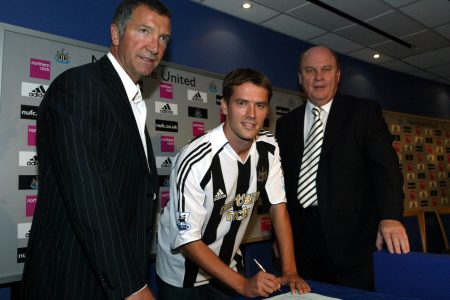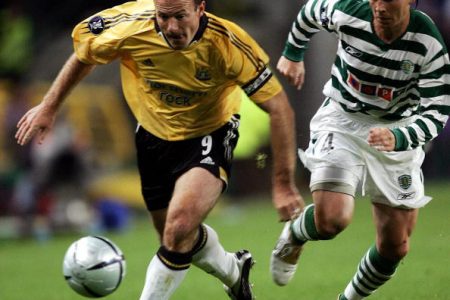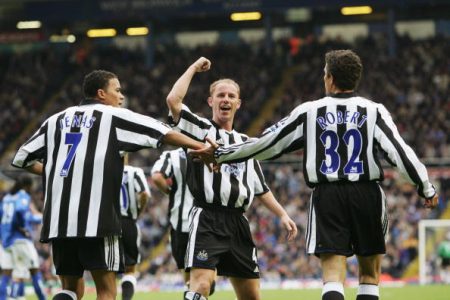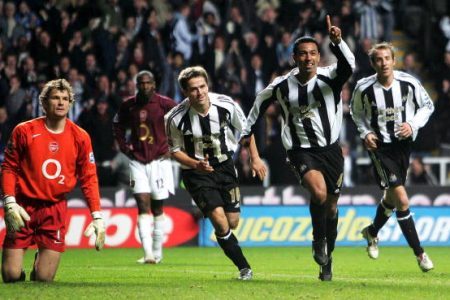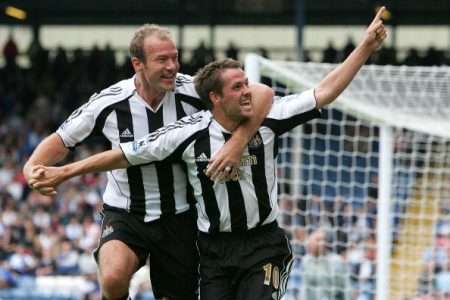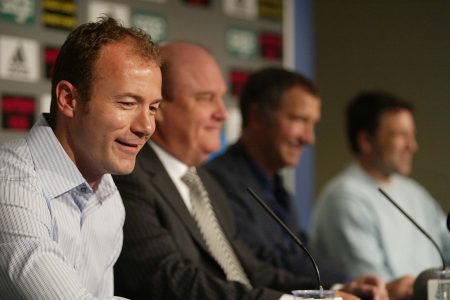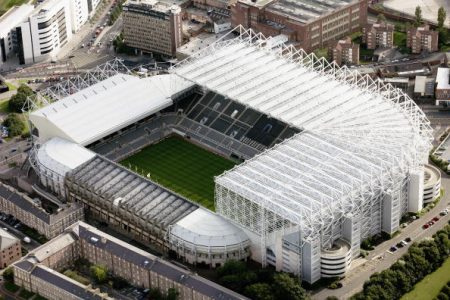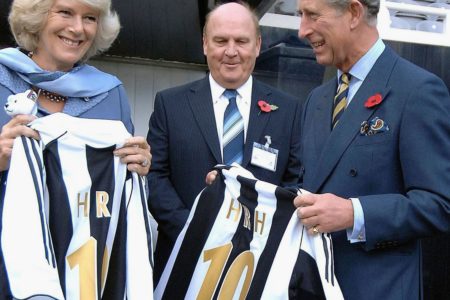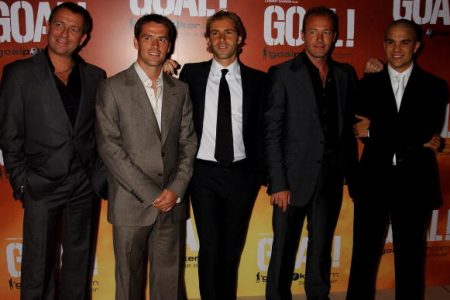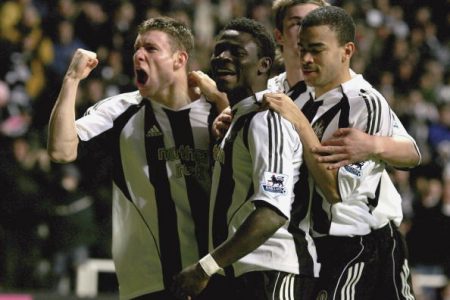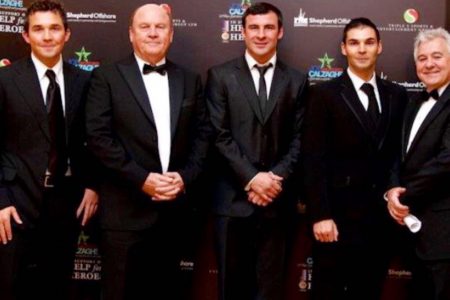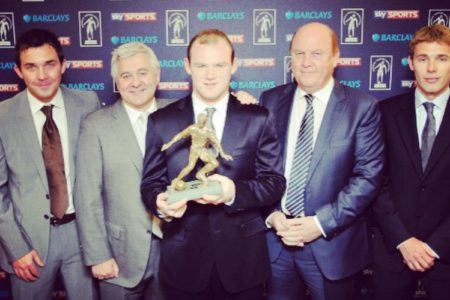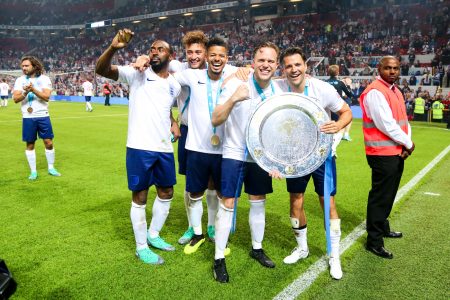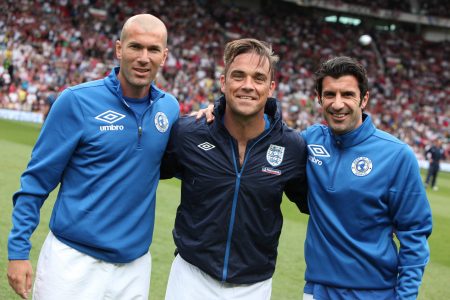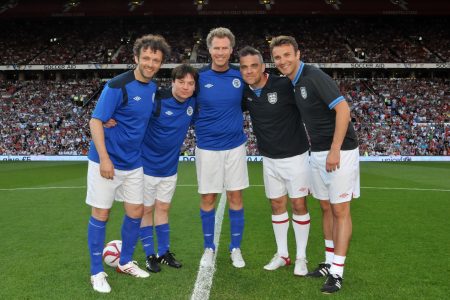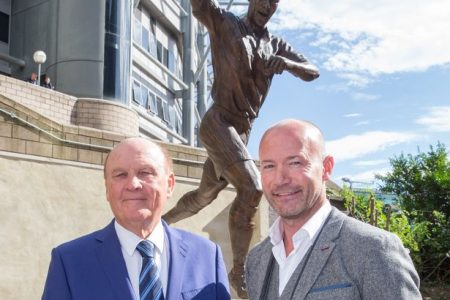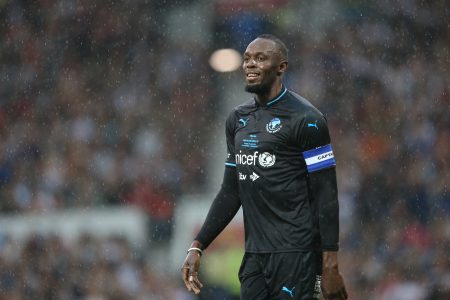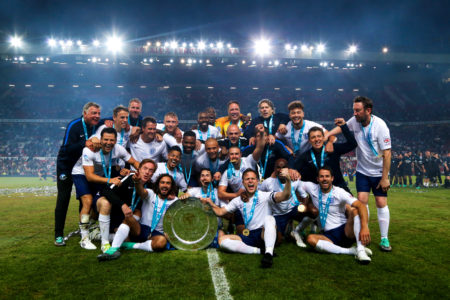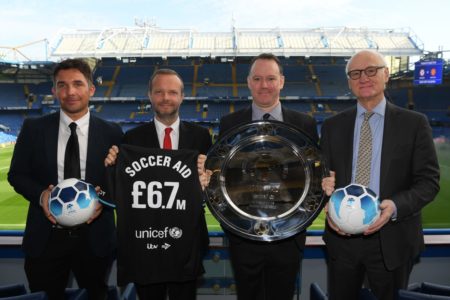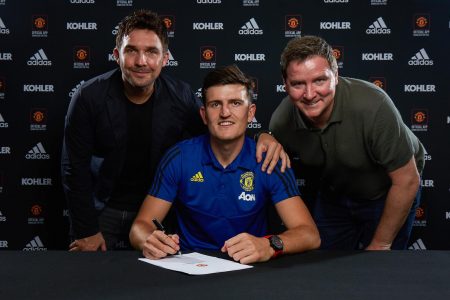About Us Sporting History
In the late 1980s, Newcastle United Football Club was in turmoil. The previous thirty years had been defined by missed opportunities, the sale of star players and relegation battles. Instability reigned on and off the pitch. The sale of Paul Gascoigne in the summer of 1988 was a seminal moment – the supporters could take no more.
The same year, with the support of the Magpie Group, Sir John Hall and Douglas Hall approached fellow local businessmen, and lifelong supporters, Freddy and Bruce Shepherd to join them to support their vision – a black and white evolution.
The Halls and Shepherds started purchasing shares in Newcastle United. The then Newcastle United board would not relinquish control and a bitter battle ensued. Without fresh direction and funds, Newcastle United would continue to haemorrhage money and risked going out of business.
In the subsequent years, the club was relegated to the old Second Division, finishing 11th in the 1990/91 season. This also culminated in the lowest ever attendance at St James’ Park of 10,004 against Oxford Utd, and an average home league attendance of only 16,879 for the season. Its financial position worsened and the future of Newcastle United had never looked so bleak. Manager Jim Smith left the club in early 1991, branding the situation ‘unmanageable’.
During the 1991/92 season, things worsened and a relegation battle ensued. Mid-season saw Sir John Hall, Douglas Hall and Freddy Shepherd finally join the board and take over day-to-day activities. A plan was hatched to save the club from relegation and from going out of business. Freddie Fletcher joined as Chief Executive and Kevin Keegan as Manager.
In Keegan’s first match in charge, he attracted 30,000 to the stadium for a 3-0 win over Bristol City, thereafter becoming known as the ‘Geordie Messiah’. An improvement in form helped the club to narrowly avoid relegation on the last day of the season. The next phase of the Hall & Shepherd plan could begin: the rebuild.
A renewed sense of optimism swept through St James’ Park and the whole city. Solid foundations were laid and exciting signings followed. Off the pitch, a new team was assembled to run the club, with Freddy Shepherd becoming Vice Chairman. Taking complete control of the club was key and was the catalyst for Kevin Keegan to commit to a three-year contract.
Keegan’s new team swept away all others before them and were crowned Champions of the First Division. The team often simply overwhelmed opponents along the way – a 7–1 victory on the final day of the season over Leicester City being particularly memorable – nearly breaking the English record of 11 consecutive wins and amassing an incredible 96 points for the season. The team scored 92 goals that season – more than any other team in England that year.
Just as in the 1980s, Keegan’s mere presence captivated the whole of Tyneside. The excitement he stirred in the supporters grew with every game; a stark contrast to previous campaigns.
The team was spearheaded by the record signing of Andy Cole for £1.75m, with negotiations led by Freddy Shepherd. The young striker was signed from Bristol City who repaid his transfer fee by scoring 12 goals in the final 11 games of the season. Cole and David Kelly were ably supported by midfielders Paul Bracewell, Gavin Peacock, Rob Lee, Scott Sellars and Brian ‘Killer’ Kilcline. A compliment of local talent was also flourishing under the new management.
Newcastle United secured promotion away at Grimsby with a 2–0 win on an emotional night for the club’s supporters. Thousands of fans invaded the pitch at the final whistle to congratulate their ‘King Kev’. After a four-year exile, Newcastle were back in the big time.
The Magpies joined the Premier League for 1993-94 season, in only the second season of the newly-formed competition. On entering the league, the club brought in new players, including re-signing fan’s favourite and local hero Peter Beardsley. Newcastle United announced their return to the top table of English football with an impressive third-place finish UEFA Cup qualification – the first time since the 1970s.
Andy Cole bagged 41 goals that season, 34 in the league – still a club record. Beardsley also found the net 24 times in all competitions. Robert Lee, Scott Sellers, Barry Venison, Ruel Fox and Darren Peacock, along with local youngsters Lee Clark, Steve Watson and Steve Howey, emerged as Premier League stars under Keegan’s guidance.
A 7-1 win over Swindon Town matched Blackburn’s record for the highest ever Premier League victory. The media labelled the team “The Entertainers’ – characterised by flowing attacks, incisive passing moves and majestic wing play.
Off the pitch, a significant redevelopment of the Club and St James’ Park continued in parallel with the record signings. A full reconstruction of the Leazes End was undertaken to create the Sir John Hall Stand, with a new Gallowgate Stand and partial renovations to the Milburn Stand following soon thereafter, creating a world class all-seater stadium with a capacity of 36,610 – a capacity that still could not satisfy every fan that wanted to get a ticket.
This development was driven daily by Freddy Shepherd ensuring the operational side of the club kept pace with the progress and ambition of the board and the supporters. The board recognised that additional expansion plans were required to keep parity with the fans’ demand and the growth of the club if they were to compete at the highest level.
The 1994-95 season saw the continued development of world-class talent, including World Cup players such as Marc Hottiger and Philippe Albert joining the ranks. The season began with Newcastle United makings their best start to any top division season in their history, winning their first six games to go top of the league. By Christmas, Newcastle United although not in the title hunt, still managed to finish in sixth place.
In the 1995-96 season, Newcastle United built on the good work of the previous season and continued to add high-profile and exciting signings, most notably Les Ferdinand, David Ginola, Warren Barton and Shaka Hislop before the start of the season; followed by Faustino Asprilla and David Batty after Christmas. The season again began brightly; winning nine of the first ten matches and only losing two league matches before Christmas. Newcastle United led the table for the majority of the campaign, but were pipped to the title by Manchester United on the last day of the season. ‘Sir’ Les Ferdinand, an immediate fans favourite topped the goalscoring charts with 29 goals, 25 in the league.
The 1996–97 season saw Newcastle United participate in the Premier League for the fourth consecutive season since their promotion. After finishing runners-up to Manchester United in the previous campaign, Hall and Shepherd continued to build on the Club’s incredible rise by backing the manager with significant transfer funds.
Freddy Shepherd initiated negotiations with Blackburn Rovers to sign Alan Shearer, beating off the competition from Manchester United and a host of other foreign clubs, resulting in a world-record transfer fee of £15 million – the local lad had come home. The signing of Alan Shearer was confirmed on 30 July 1996, and he was revealed a week later in front of more than 15,000 fans behind and inside the Sir John Hall Stand.
Newcastle started the league campaign strongly, winning seven of their opening eight games. A 5–0 victory over Manchester United on 20 October 1996 at St James’ Park continued this rich vein of form. However, following a poor run of form and manager Kevin Keegan’s resignation in January 1997, the dream of another title challenge was not maintained.
Keegan’s replacement, Kenny Dalglish, was soon appointed and produced a late season surge in form, including a crucial win at Highbury on 3 May 1997 and a 5–0 rout of Nottingham Forest on the final day of the season. As a result, Newcastle United finished runners-up again to Manchester United and qualified for the Champions League for the first time.
In the 1996–97 UEFA Cup, Newcastle also performed well and reached the quarter-finals but were ultimately beaten by a Thierry Henry led AS Monaco. In 1997, Freddy Shepherd became Chairman of Newcastle United and took over the day-to-day running of the club from Sir John Hall.
Plans where immediately finalised with the board to expand the St James’ Park capacity to over 52,000. Construction began in July 1998 and included the addition of double tiers to the Milburn and Sir John Hall Stand. Off the pitch, the club was competing with the best in the world. Financially, the club generated the fifth highest worldwide turnover, only surpassed by Manchester United in England.
The highlight of the 1997–98 season was to be the club’s run in the UEFA Champions League, seeing them defeat Croatia Zagreb, Dynamo Kiev and Barcelona 3–2, including a memorable hat-trick from striker Faustino Asprilla. The club enjoyed a good run in the 1997–98 FA Cup and reached the final for the first time in 24 years, only to fall to a 2–0 defeat by league champions Arsenal.
Led by Freddy Shepherd, the Club also continued its expansion beyond football – creating the Newcastle Sporting Club, comprised of Newcastle Falcons (Rugby Union), Newcastle Cobras (Ice Hockey), Newcastle Eagles (Basketball) and Newcastle Storm (Le Mans 24-hour racing team). The Newcastle Falcons, in their first season in the newly-professional Rugby Union era, under the leadership of Rob Andrew and with a young Jonny Wilkinson and all-star signings of Doddie Weir, Gary Armstrong, Pat Lam and Tony Underwood were crowned champions in 1998.
In the 1999-2000 season, Sir Bobby Robson was appointed club manager. His first game proved a Premier League club record, an 8-0 victory over Sheffield Wednesday F.C., with Alan Shearer scoring five of the goals. By the end of the season, Newcastle United were the division’s third-highest scoring team with 63 goals from 38 games.
In the 2000–01 season, the Club continued to press ahead with the initial success following Sir Bobby Robson’s appointment. With him, the team showed the potential for the forthcoming seasons and the Club saw the average home attendance reach 51,309. A new breed of attacking and expansive football was coming back to Newcastle.
In the 2001-02 season, under Shepherd and Robson, Newcastle United started to develop an exciting young team with the likes of Kerion Dyer, Craig Bellamy, Laurent Robert and Jermaine Jenas, supported by crowd favorites Alan Shearer, Gary Speed and Shay Given. A title challenge re-emerged and Newcastle United were at one point unlikely contenders during the 2001-02 season. The team finally finished at an impressive fourth place, memorably returning to the summit of the league for Christmas in 2001 – following away wins at Arsenal and Leeds. Freddy Shepherd and the Board backed the manager by signing Hugo Vianna and Jonathan Woodgate.
This brought a renewed hope for the Club who again qualified for the Champions League – for only the second time. Alan Shearer hit back with 27 goals in all competitions, with the team scoring 72 league goals in total.
In the 2002-03 season, the Club continued to improve on their league position by finally finishing third, which saw their return to the Champions League. They then beat Juventus, Dynamo Kiev and Feyenoord, reaching the second group stage. The club once again met Inter Milan and then drew 2-2 at the San Siro with a Shearer brace – in front of 15,000 travelling Geordies.
Newcastle finished fifth in the league at the end of the 2003-04 season, again qualifying for Europe. Despite exiting the Champions League in the qualifying rounds, their Europe adventure continued until the semi-final of the UEFA Cup, beating the likes of FC Basel, Real Mallorca, PSV Eindhoven, only to be undone by Didier Drogba’s Marseille.
After nearly five years in charge, Bobby Robson left the club following an indifferent start to the 2004-05 season. Graeme Souness took charge. Newcastle had again qualified for the UEFA Cup with a fifth-place finish the previous season and managed to reach the UEFA Cup quarter-finals beating the likes of Panionios, Dinamo Tbilisi, Sochaux, Heerenveen and Olympiacos.
The team were eventually defeated by Portuguese side Sporting Lisbon in the quarter final home leg, but lost in the away match after suffering several injuries. In the FA Cup, the club also progressed to the semi-final. The club again qualified for Europe via the Intertoto Cup.
In 2004, Newcastle United were ranked as the world’s 9th largest football club by revenue in the Deloitte Football Money League, at €139.3 million.
Following extensive filming at St James’ Park, the film Goal! was released in 2005, a sports drama about a young aspiring footballer who is offered a chance to trial with Newcastle United.
In the 2005-06 season, the Newcastle United board backed the manager again. They broke the club’s transfer record by signing Michael Owen from Real Madrid for £16 million, a record that stood until 2019.
On the pitch, Newcastle United progressed to the semi-final of the Intertoto Cup, eventually losing to Deportivo La Coruna. In April 2006, under Glenn Roeder, Alan Shearer scored his 201st goal for the club – breaking Jackie Milburn’s record and becoming the club’s highest goalscorer in Newcastle United’s history. Roeder, who had taken over mid-season, led the Club to a respective 7th position, winning nine out of the remaining 14 Premier League games, including a notable 4-1 win over Sunderland at the Stadium of Light, which made for another European qualification.
In 2006, Newcastle United once again reached the Deloitte Football Money League, ranked as the the world’s 12th largest football club by revenue, at €128.9 million.
In the 2006-07 season, Newcastle United competed in the UEFA Cup, progressing past Fenerbahce, Palermo and Celta de Vigo, eventually going out to AZ Alkmaar over two legs. The Club then qualified to win the UEFA Intertoto Cup, their first trophy for 37 years.
In May 2007, the Hall family sold their shares in Newcastle United to Mike Ashley of Sports Direct, followed by the Shepherd family. This ended Freddy Shepherd’s tenure as Chairman and Shepherd Offshore’s 16-year association with Newcastle United, leaving Newcastle United established in the Premier League since its promotion in 1993 and regular participant in Europe and a world-class football stadium and training ground.
- First Division Champions in 1992/93
In the Premier League:
- 3rd in 1993/94
- 6th in 1994/95
- 2nd in 1995/96 and 1996/97
- 4th in 2001/02
- 3rd in 2002/03
- 5th in 2003/04
- 7th in 2005/06
In the FA Cup:
Newcastle United finished runners-up twice:
- 1997/98 v Arsenal, Wembley Stadium
- 1998/1999 v Manchester United, Wembley Stadium
Semi-finalists twice:
- 1999/2000 v Chelsea, Wembley Stadium
- 2004/05 v Manchester United, Millennium Stadium
During these years Newcastle United also qualified for Europe 11 times (games played in brackets) playing 88 games in total.
- UEFA Champions League twice – 1997/98 (8), 2002/2003 (14)
- ICFC/UEFA Cup eight times – 1994/95 (4), 1996/97 (8), 1999/00 (6), 2000/01 (6), 2003/04 (12), 2004/05 (12), 2005/06 (4), 2006/07 (12)
- European Cup Winners Cup entry – 1998/99 (2)
In the UEFA Cup:
Newcastle United finished:
- Semi finalists in 2003/04 v Marseille
- Quarter finalists in 2004/05 v Sporting Lisbon
Most League & Cup goals in a season:
41, Andy Cole 1993-94
Top Scorer:
Alan Shearer with 201 goals, 1996-2006
In 2008, a partnership between Shepherd Offshore and Paul Stretford saw the launch of Triple S Sports and Entertainment Group Ltd. The company, based in Manchester, represents a number of sporting professionals from around the world. Triple S provides a complete representation and management service, with over 36 players under management, including Wayne Rooney, Harry Maguire, Angus Gunn and Toni Duggan.
Triple S is also an event management and communications company, with an impressive portfolio of successful events, including Joe Calzaghe’s Gala Dinner in aid of Help for Heroes and Soccer Aid, in partnership with UNICEF UK.
Soccer Aid is an annual British Charity event raising millions of pounds in aid of UNICEF UK. The event is a friendly football match between two teams- England and the Rest of The World- composed of celebrities and former professional players representing their countries. Soccer Aid began in 2006 and its success has grown year on year, raising funds for children all over the world.
In 2016, Freddy Shepherd erected a statue in celebration of Alan Shearer at St James Park. Northumberland artist Tom Maley spent almost six months casting the structure, which shows Shearer celebrating a goal with his iconic hand-in-the-air pose.
In 2018, Triple S continued to grow from strength to strength growing its capability on all platforms through Digital Media, Sports, Event and Talent Management.
Also in 2018, Soccer Aid announced that the 2018 campaign had raised a record-breaking total of £6,746,557, all of which was donated to UNICEF UK to help protect children in danger around the world. To read more about it, click here. Soccer Aid 2018 attracted a peak ITV audience of 5.9 million viewers and a record crowd of 71,965 at Manchester United’s Old Trafford Stadium.
The multi-stakeholder project will be run by newly-formed Soccer Aid Productions, a joint venture between UNICEF UK and Triple S Events, part of the Triple S Sports & Entertainment Group. Both parties are working in collaboration with producers Initial, part of EndemolShine UK. Soccer Aid Productions’ commitment to Soccer Aid for UNICEF is underpinned by a three-year ITV commission with Initial Productions to screen the celebrity match in primetime during the summers of 2018, 2019 and 2020.
Over the years, Soccer Aid for UNICEF has raised over £30 million for the benefit of UNICEF UK. Soccer Aid for UNICEF is the original professional/celebrity charity football match that has already featured A-list stars such as Will Ferrell, Woody Harrelson, Mike Myers and Niall Horan plus footballing (& sports) legends including Usain Bolt, Mo Farrah, Maradona, Zinedine Zidane, Luis Figo and Ronaldinho.
Kenneth Shepherd, executive director of Soccer Aid Productions said: “The new-look Soccer Aid for UNICEF is the legacy of Robbie Williams and Jonathan Wilkes who – back in 2003 – conceived the idea, which my late father Freddy Shepherd developed to help realise their dream.”
“To date, it has raised an incredible amount of money for UNICEF through the generosity of the public plus engagement of A-list stars, football legends, the FA, ITV and, of course, Manchester United. The new full-time 365 structure of Soccer Aid Productions and ITV commission will enable us to achieve that vision of turning Soccer Aid for UNICEF not just into a UK success story, but it will create the platform to take Soccer Aid for UNICEF global.”
On Sunday 16 June 2019, Soccer Aid for Unicef took place at Chelsea’s Stamford Bridge. Over £6.8 million was raised on the night as a star-studded lineup of football legends and celebrities battled it out on the pitch so that more children can grow up happy, healthy and able to play.
In August 2019, Triple S Sports & Entertainment Group brokered the transfer of England defender Harry Maguire from Leicester City to Manchester United in a world-record £80 million deal.
About Us
We are an established, innovative and driven organisation, working in partnership with employees, suppliers, local government and customers alike and we will stop at nothing to deliver the best solutions and expertise possible. Local teamwork, with global results.
The Company has strategically invested and developed local infrastructure which has directly attracted the Oil and Gas sector, Marine, Renewable Energy providers and Construction Industries to the Region & beyond. All supported and communicated through our many corporate values based on responsible regeneration and partnership working.
Latest News
-
Shepherd Offshore Proudly Supports Charity Football Match in Memory of Jordan Dolding and Michael Simpson
Shepherd Offshore and its team were proud to support a recent charity football match held in loving memory of Jordan... Read More
-
Shepherd Offshore Presented with a Certificate of Recognition
Shepherd Offshore was honoured to welcome Tratos representatives Prof. Maurizio Bragagni Esq OBE and Dr. Lorenc Xhaferraj to our Offshore... Read More
-
Ocean Survivoar – Shepherd Offshore Wishes Annasley Park Success in Her 2025 Ocean Survivor Challenge
Shepherd Offshore is delighted to extend its heartfelt support and best wishes to Annasley Park as she prepares for the... Read More
- © 2025 Shepherd Offshore
- Privacy Policy
- Website Use Terms
Website Cookies
We use cookies to ensure you have the best possible experience while using our website and to analyse how our website is performing. These cookies are safe and secure and do not contain any sensitive information and cannot be used to identify you. However, if you would like to change which cookies are used, you can click on the "Manage" button below. By clicking "Accept Cookies", you confirm that agree with our use of cookies and that you have also read our Privacy Policy and Website Use Terms, available in the website footer below. To read our Privacy Policy and find our more about our use of cookies, click on Learn More

